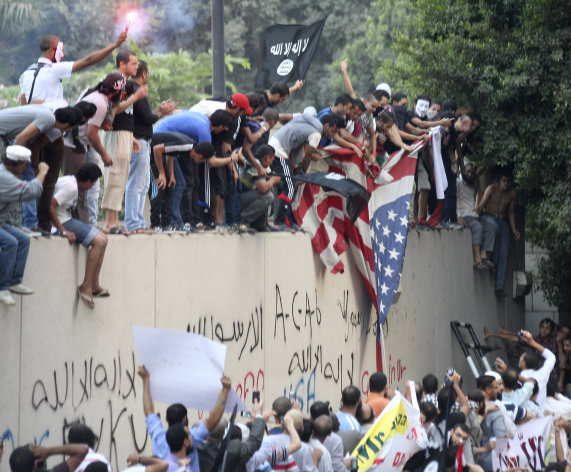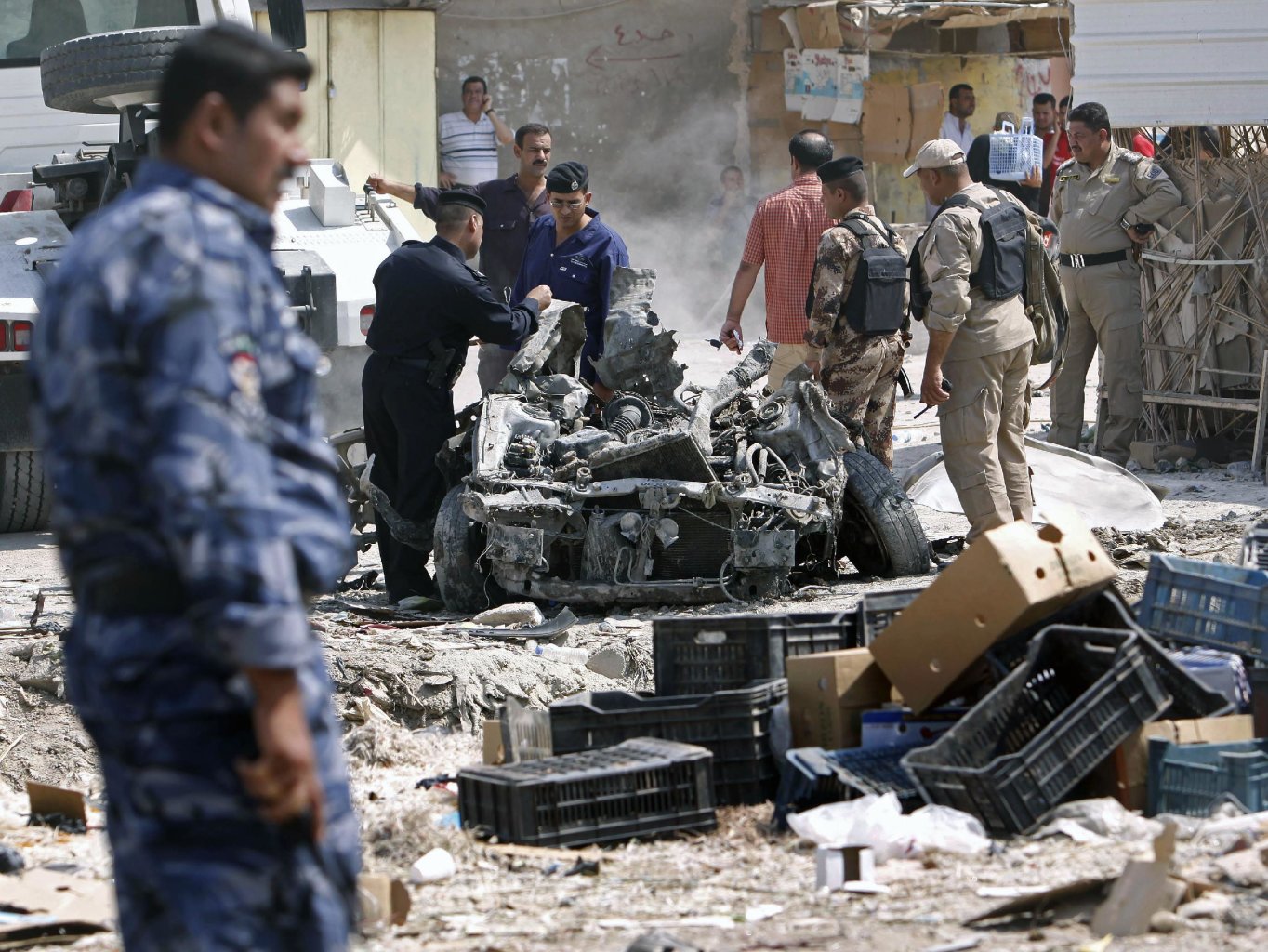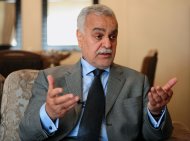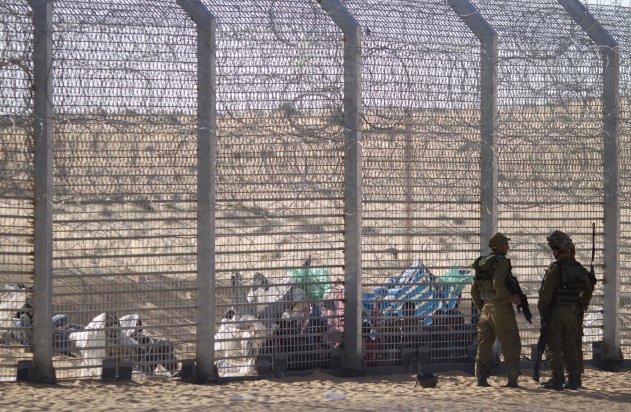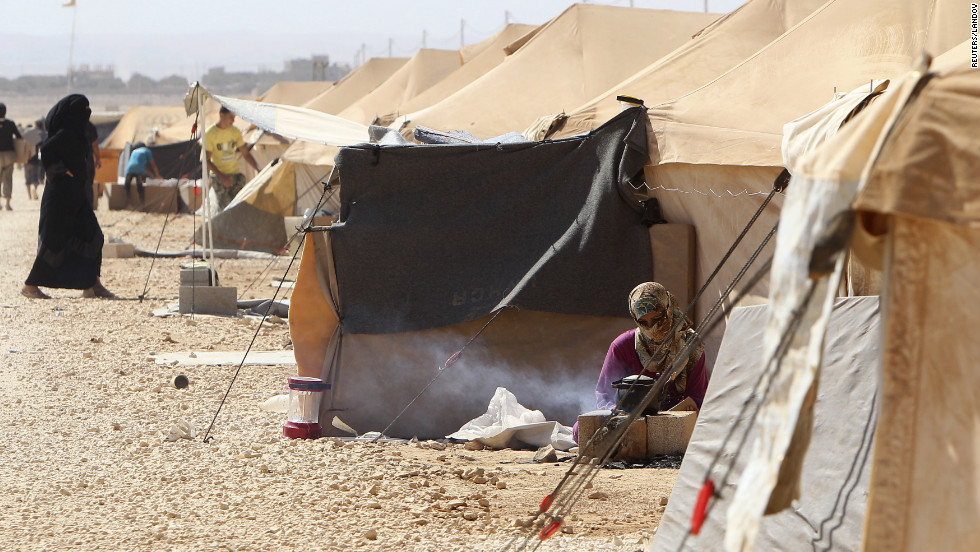The U.S. State Department on Friday formally removed the Iranian dissident group Mujahadin-e Khalq from its official list of terrorist organizations in a move which, according to political analysts is bound to deteriorate the relations with Iran even further.
Secretary of State Hillary Clinton took the decision, as the State Department stated, in view of the MEK's public renunciation of violence, the absence of confirmed acts of terrorism by the MEK for more than a decade, and their cooperation in the peaceful closure of their paramilitary base in Iraq, where several thousand members of the MEK got stranded in 2003 after their former mentor, Saddam Hussein, disappeared from the political stage. It seems the remaining MEK-members have agreed to be move to Camp Liberty, a former U.S. military base under UN-supervision in Baghdad, from where they are expected to be resettled overseas.
 |
| Portraits of the Rajavi couple at the entrance of Camp Ashraf (Getty, 1986) |
The group, which was founded in 1963 as an armed Marxist-Leninist opposition group to the shah, was already terrorist in the 70-ties, with assassinations of American diplomats and personnel, among other things. After the 1979 revolution in which it took an active part, it fell out with the Khomeini-regime and thereafter it became extremely violent. It committed bomb attacks against the Islamic leadership in which hundreds were killed. According to IPS in a thoroughly written profile of the group, this went on in the eighties at a rate of three killings per day. The leaders, the couple Massoud and Maryam Rajavi, moved to Paris in 1981, but after France recognized the Islamic Republic, they went to Iraq, where the movement got tanks and heavy weapons from Saddam Hussein with which it made frequent incursions into the eastern Kurdish areas of Iran and caused havoc and destruction. Since that time the group is generally perceived by Iranians as a bunch of traitors and quislings.
The internal relations within the group deserve a special mention. I myself interviewed Massoud Rajavi in 1984 in Paris for the Dutch daily 'de Volkskrant' and was struck by the cult like way his followers talked about the fact that his wife Maryam, shortly beforehand, had left her husband in order to marry Rajavi 'for the sake of the movement'. In later years I heard many stories about the way people were deceived or even duped in becoming members of the MEK. In the 7 June issue of the London Review of Books, Owen Bennet-Jones painted a detailed picture of the movement, including the incredible ways in which it deals with its members.
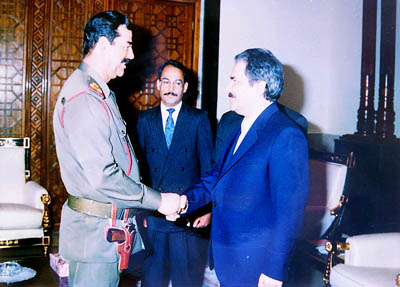 |
| Rajavi meets Saddam (ca. 1986) |
The lifting of the terrorist status by Hillary Clinton came after several years of lobbying by the MEK itself and a number of influential supporters. Among them, are according to the IPS, which published a profile of the MEK, two former CIA. directors, R. Jame Woolsey and Porter J. Goss; a former F.B.I. director, Louis J. Freeh; a former attorney general, Michael B. Mukasey; President George W. Bush’s first homeland security chief, Tom Ridge; President Obama’s first national security adviser, Gen. James L. Jones; big-name Republicans like the former New York mayor Rudolph W. Giuliani and Democrats like the former Vermont governor Howard Dean; and even the former top counterterrorism official of the State Department, Dell L. Dailey.” Mitchell Reiss, a top foreign policy advisor to Mitt Romney/Paul Ryan presidential campaign, also spoke on behalf of the group.
IPS notes: One potential explanation for this diverse list of supporters are the large speaking fees the MEK network has offered to big-name public figures. “Your speech agent calls, and says you get $20,000 to speak for 20 minutes,” said a State Department official quoted by the Christian Science Monitor. “They will send a private jet, you get $25,000 more when you are done, and they will send a team to brief you on what to say.” Pro-MEK individuals and organizations also reportedly donated thousands of dollars to the campaigns of several sitting members of Congress, including Reps. Ileana Ros-Lehtinen, Bob Filner, Ted Poe, Mike Rogers, and Dana Rohrabacher.
The American State Department did keep some distance from the MEK when it took the group from the terrorism list. For instance it commented that "with today's actions, the Department does not overlook or forget the MEK's past acts of terrorism, including its involvement in the killing of U.S. citizens in Iran in the 1970s and an attack on U.S. soil in 1992." Also it implicitly recognized the sectarian traits of the MEK and the internal terror it exercizes in order to keep the group together when it said that ''the Department also has serious concerns about the MEK as an organization, particularly with regard to allegations of abuse committed against its own members."
Also a State department official stated in a briefing that "We have no evidence and we have no confidence that the MEK is an organization that can promote democratic values that we would like to see in Iran.They are not part of our picture in terms of the future of Iran." This, however, does not neutralize the fact that the rehabilitation of the MEK is a new dangerous step in the ongoing confrontation between the West ad Iran.


.jpg)








